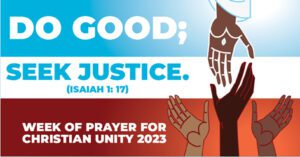
WASHINGTON (OSV News) – The annual observance of the Week of Prayer for Christian Unity began as an octave of prayer, sermons and conferences encouraged by Pope Leo XIII and Anglican leaders. But the celebration picked up steam following the Second Vatican Council committing the Catholic Church to this path.
During his 53 years as a priest — and even before that — Father James Gardiner, director of special projects at the Franciscan Monastery of the Holy Land in Washington, has had something to do with promoting the annual Week of Prayer. The week was first celebrated Jan. 18-25, 1908, by Father Paul Wattson and Mother Lurana White, Episcopal co-founders of the Franciscan friars and sisters of the Atonement, who entered into full communion with the Catholic Church the following year.
Father Gardiner highlighted a number of documents promulgated by the Catholic Church since Vatican II, which created a “great ecumenical ferment as we trooped and snooped through one another’s sacristies and sanctuaries,” he said.
“There was a kind of ecumenical euphoria that set in” in the U.S. and around the globe, he noted.
Among the Catholic Church’s many documents on ecumenism and interfaith relations is Vatican II’s Decree on Ecumenism (“Unitatis Redintegratio”), promulgated Nov. 21, 1964, which taught that ecumenism — the restoration of unity among all Christians — should be everyone’s concern. It stated genuine ecumenism involves a continual personal and institutional renewal.
The following year, the Declaration on the Relationship of the Church to Non-Christian Religions (“Nostra Aetate”) was issued, defining the church’s position on interreligious dialogue.
In 1999, the Catholic Church’s “Joint Declaration on the Doctrine of Justification” with the Lutheran World Federation provided a common basis for understanding how people are justified and saved.
Ten years later came Pope Benedict’s “Anglicanorum Coetibus,” the papal constitution that created the personal ordinariates enabling Anglicans and Episcopalians to enter the Catholic Church and have a permanent home for their Anglican heritage, which the late pope called a “treasure to be shared.”
Pope Francis later authorized all the ordinariate liturgical books known collectively as “Divine Worship,” marking the first time the Catholic Church had officially adopted into its public worship liturgical elements that had developed within a Reformation church context.
This year’s observance has as its theme “Do Good; Seek Justice,” taken from the Book of Isaiah, which is a timely one, Father Gardiner noted but he also remarked on the significance of last year’s theme to churches’ ecumenical. It was selected by the Middle East Council of Churches: “For we have seen his star in the East and have come to worship him” (Mt 2:2).
“I remember proposing that ecumenists, like the Magi, would do well to find yet another route back to Christian unity,” Father Gardiner told OSV News, “not because enormous progress has not already been made, but because too many of the faithful and their pastors are laboring under the impression that we’ve gone about as far as we can go.”
Ecumenical relationships “need to be studiously nourished throughout the year,” he remarked.
He also emphasized that “the role of prayer” needs to be prioritized during the Week of Unity, because “as we know,” prayer “changes not God, but the one who prays to God.”
